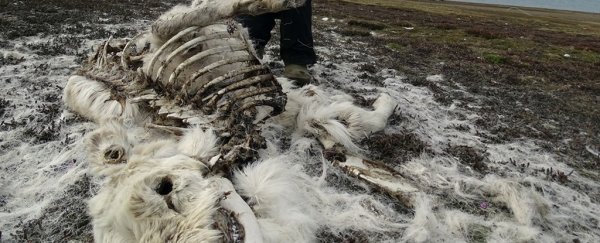Over 200 Svalbard reindeer have been found dead on the Norwegian archipelago of Svalbard. That's one of the highest recorded death tolls since population monitoring commenced in 1978, and scientists believe climate change played a key role.
According to a report on the Norwegian Polar Institute's website, the reindeer (Rangifer tarandus platyrhynchus) suffered a lean Winter, starving to death because of a shortage of food.
Those that didn't starve to death were found to be underweight.
"It is scary to find so many dead animals. This is a terrifying example of how climate change affects nature," Norwegian Polar Institute ecologist Ønvik Pedersen told NRK. "It's just sad."
The Svalbard reindeer, endemic to the archipelago, is considered a special responsibility by Norwegian scientists because it is a key species that is vitally important to the ecosystem of the tundra.
Although their predators are few, their carcasses are an important part of the diet of the Arctic fox (Vulpes lagopus) that also inhabits the region, and the reindeer compete for food with a number of bird species.
So any change in reindeer numbers is likely to have an effect on other animal populations too, as well as vegetation growth.
The food shortage, the ecologists believe, was brought about by temperatures in the Arctic. This results in higher rainfall during Winter, which freezes on the ground, producing a hard, thick layer of ice.
Usually, the reindeer can dig through the snow to reach the vegetation underneath, but the ice layer is impenetrable, so the reindeer starve.
In addition, warmer weather can result in a longer breeding season. That sounds good, but in Winter that results in greater competition for food, and taking greater risks for food, climbing the sides of mountains to reach higher vegetation. And the weakest animals are less likely to survive. That means the older ones die first - but so do the very young.
That could have a long-term effect on population numbers.
"Svalbard is now experiencing the biggest and fastest changes in air temperature on land," wrote Norwegian Polar Institute ecologist Åshild Ønvik Pedersen in a report.
"The consequences for the state of ecosystems are currently unclear, but can potentially be so dramatic that monitoring must be prepared to be able to adapt quickly to the new conditions."
